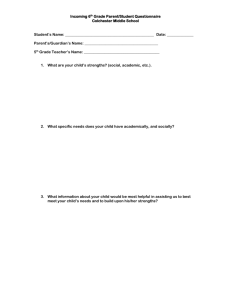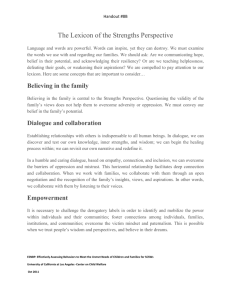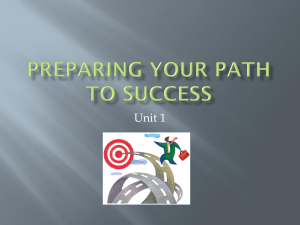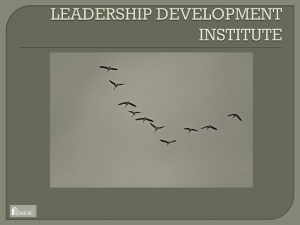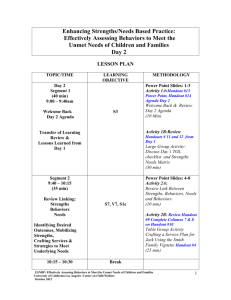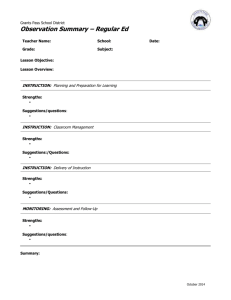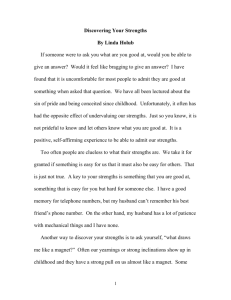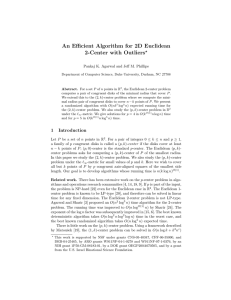Principles of the Strengths Perspective
advertisement
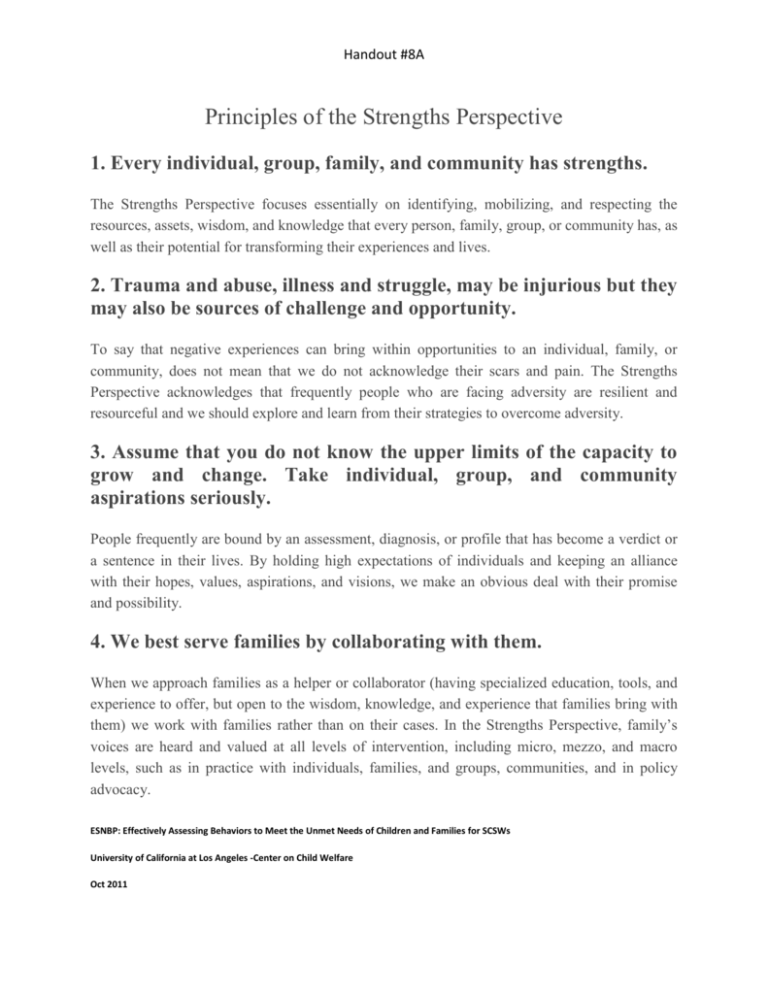
Handout #8A Principles of the Strengths Perspective 1. Every individual, group, family, and community has strengths. The Strengths Perspective focuses essentially on identifying, mobilizing, and respecting the resources, assets, wisdom, and knowledge that every person, family, group, or community has, as well as their potential for transforming their experiences and lives. 2. Trauma and abuse, illness and struggle, may be injurious but they may also be sources of challenge and opportunity. To say that negative experiences can bring within opportunities to an individual, family, or community, does not mean that we do not acknowledge their scars and pain. The Strengths Perspective acknowledges that frequently people who are facing adversity are resilient and resourceful and we should explore and learn from their strategies to overcome adversity. 3. Assume that you do not know the upper limits of the capacity to grow and change. Take individual, group, and community aspirations seriously. People frequently are bound by an assessment, diagnosis, or profile that has become a verdict or a sentence in their lives. By holding high expectations of individuals and keeping an alliance with their hopes, values, aspirations, and visions, we make an obvious deal with their promise and possibility. 4. We best serve families by collaborating with them. When we approach families as a helper or collaborator (having specialized education, tools, and experience to offer, but open to the wisdom, knowledge, and experience that families bring with them) we work with families rather than on their cases. In the Strengths Perspective, family’s voices are heard and valued at all levels of intervention, including micro, mezzo, and macro levels, such as in practice with individuals, families, and groups, communities, and in policy advocacy. ESNBP: Effectively Assessing Behaviors to Meet the Unmet Needs of Children and Families for SCSWs University of California at Los Angeles -Center on Child Welfare Oct 2011 Handout #8A 5. Every environment is full of resources. Every environment is full of individuals, families, informal groups, associations, and institutions willing to help others. When given the opportunity, they contribute with all kinds of assets and resources that others profoundly need, such as knowledge, company, special talents, time, and place, and the like. There are resources, partnerships, and strengths available in the community that are ready to be used, while we engage in policy advocacy and social action in pursuit of social justice and structural transformation. 6. Caring, caretaking, and context. Human well-being is essentially related to caring. We should facilitate and assist families, groups, and communities to care for their members. The Strengths Perspective focuses, in a sense, also in caretaking, since this is related to hope; “hope realized through the strengthened sinew of social relationships in family, neighborhood, community, culture, and country.” (p. 20). 7. Families have the right to make mistakes and learn from them. Every situation and decision can be viewed as an opportunity to learn and grow. Even the decision that may not work best for families should be regarded by the helping professional as a learning opportunity. Rather than penalizing the family for its decision, allow for discussion as to what may have been behind the decision, why the decision was unsuccessful and what can be done differently to effect positive outcomes. 8. Know yourself and your family. Knowing who you are, your strengths, cultural values, capacities, biases and limitations is important to understand when working with families in need. Your ability or lack thereof to understand or empathize with another may be directly related to your personal experiences and beliefs. In addition, your ability to learn from and about the families you engage is critical in ensuring a successful working relationship. Adapted from, Saleebey, D. (Ed.). (2006). The Strengths Perspective in social work practice (5th ed.). Boston: Allyn & Bacon. ESNBP: Effectively Assessing Behaviors to Meet the Unmet Needs of Children and Families for SCSWs University of California at Los Angeles -Center on Child Welfare Oct 2011 Handout #8A ESNBP: Effectively Assessing Behaviors to Meet the Unmet Needs of Children and Families for SCSWs University of California at Los Angeles -Center on Child Welfare Oct 2011
